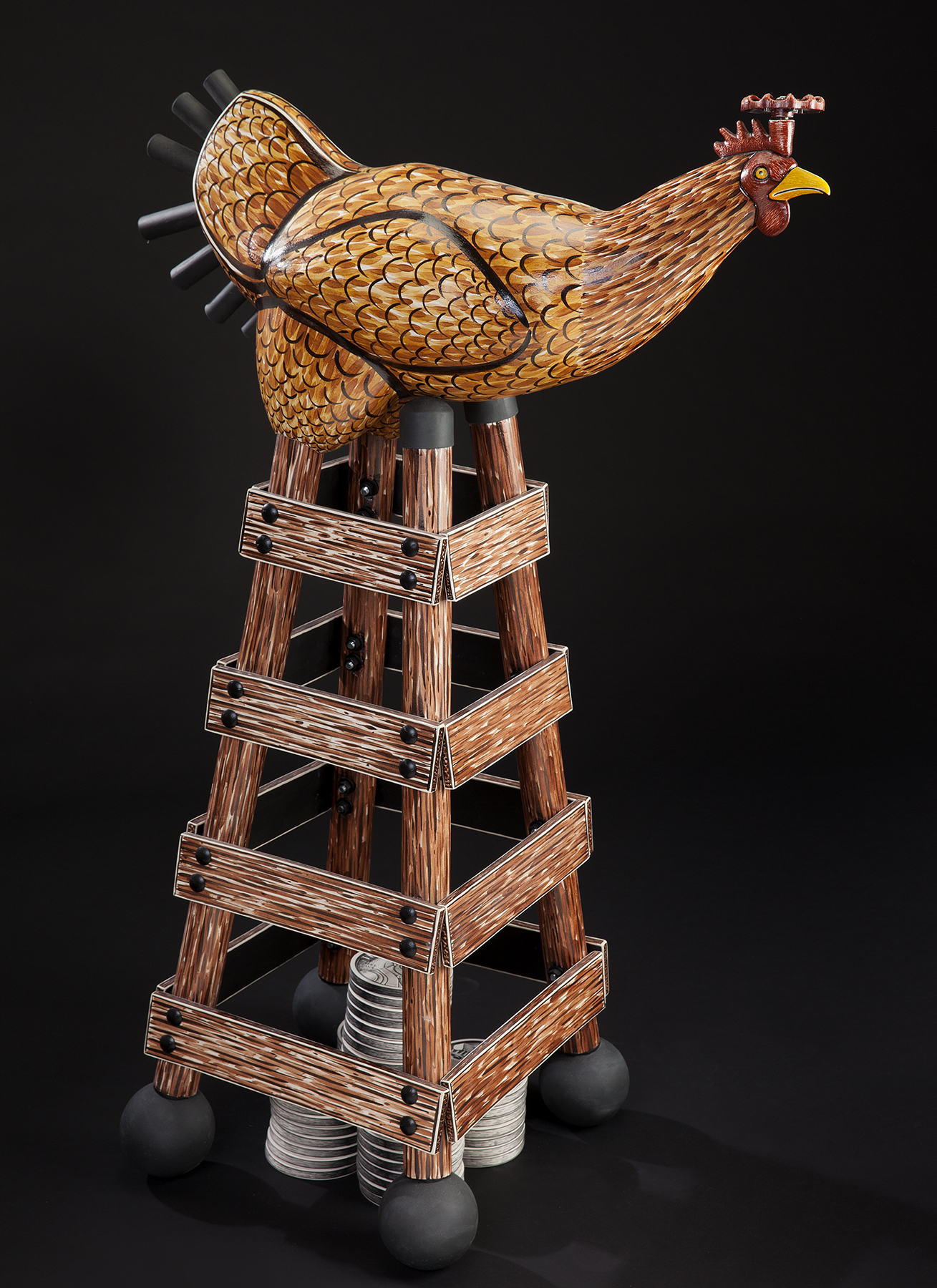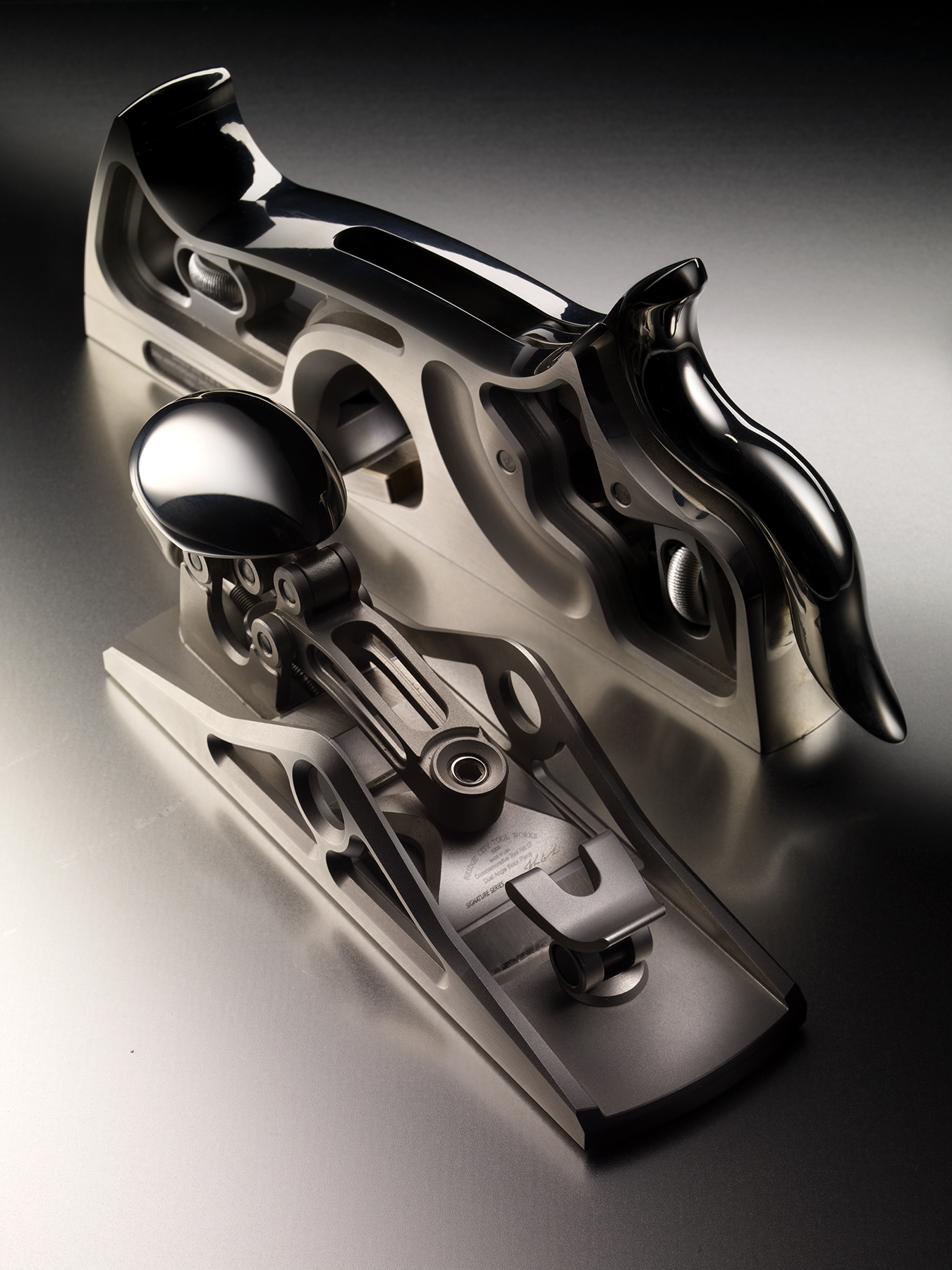Back when BAM relaunched itself as the Bellevue Arts (plural, not singular, though people still get it wrong) Museum, I wondered why they didn’t go all the way and add crafts. But that would have meant more letters on the stationery and museum facade, and it would’ve spoiled the clean acronym: BACM or BMAC instead of BAM. Still, three current shows tend toward that silent C (as does the new wood-focused biennial; more on that in the weeks ahead), featuring two disparate artists and one Portland woodworker-turned-toolmaker. The trio has little in common, but what other Northwest museum would feature them at the same time? They certainly wouldn’t fit into the old singular-A notion of art.
The ceramics of
Bellingham artist Jason Walker are equally whimsical and political. In his first solo museum show, On the River, Down the Road (a nod to Kerouac, his hero), the built and the natural realms vie for the same contested turf. In eight painted porcelain works created for the show, we see wolves, salmon, deer, and ravens uneasily coexisting with our roads, cities, and oil derricks. A kind of symbiosis or mutation has taken place here. A chicken pumps out coins instead of eggs. Pavement is transmogrified into a stream. Birds build their nests out of pipe fittings.
Money is the new pollution, and Walker surrounds one wall-mounted work with coins of his own minting. Instead of e pluribus unum, their slogans read “United States of Petro,” “Borrow, Buy, Drive,” and “Debt Nonsense.” Walker is clearly opposed to the guns, skyscrapers, and cars that capitalism has brought, but his creatures have perhaps adapted faster than he has. (Maybe this is evolution at work.)
Trained in commercial art, Walker is an excellent draftsman, and the inlaid painted scenes on his ceramic tableaux (almost like altars) have a crisp graphic clarity. Somehow his linework reminds me of that of cartoonist Gary Larson, whose animals also often rebuked their supposedly civilized owners. The gently satirical component here feels a bit dated, as if sprung from the bad old days of Dubya and Cheney, but the recent midterm elections give the show a newly prophetic power. Walker’s ideas aren’t complicated, but they’re certainly compatible with our region’s politics (more so in Seattle than Bellevue).
One of the subtler notions you see in several works is that of flow: pipes and distributor caps and rivers and freeways. Nature is not static; it keeps moving through, around, and beneath what we build. Permanence is but a human delusion; and time—always moving, always flowing—will eventually erase our cities and restore the natural order. You get the feeling Walker will be fine with that. (The show runs through March 1.)
Traveling from Australia, making its first stop in the U.S., there are about three dozen glass creations in Nick Mount’s The Fabric of Work (on view through February 1). He’s been practicing his art for more than 40 years and even trained at Pilchuck, but this is a more recent selection. Certainly he has his craft well-honed. The control of color and shape is formidable in his bulbs, orbs, vases, and pendants. Some have delicate flowering stamens; others are intricate bottles with ornate stoppers. It’s all strictly decorative work, completely uninteresting to me, but suited to posh waiting rooms at dentists’ offices or on the mantels of gas fireplaces in new Bellevue highrises. There’s nothing massive on the scale of Chihuly here, but Mount appeals to the same collector’s market. (He’s represented locally by Traver Gallery.)
Organic forms are easily traced; you see suggestions of horns and seeds, shells and pine cones. It’s all potpourri, only more expensive. Yet Mount is something of a magpie who occasionally incorporates odd materials with his polished work. Old fishing rods suspend some of his plumb-bobs, and a metal shoehorn is used as a flasher on one of these fanciful tabletop angling rigs. Apparently he’ll use anything he finds in the shop; one wishes for more such improvisation, a trace of the humble, even whimsical, that one sees in Walker’s adjacent gallery.
More consonant
with the biennial wood show upstairs is Quality Is Contagious (through February 1), which contains a small selection of the woodwork of Portland’s John Economaki. Examples from the ’70s and ’80s are quite impressive—pure joinery (meaning no nails or screws), dovetails and elegant corners, interesting selections of grain, and completely one-off, handmade creations. Then comes the cruel turn: Economaki the woodworker somehow became allergic to wood dust, effectively ending his career behind the saw.
In response—and this is the show’s main focus—Economaki started a new business called Bridge City Tool Works, which sells high-end planes, mallets, hand drills, jigs, chisels, and the like. So if you (or your dad) enjoy expensive tool porn, this is like a tour through the showroom. And that, of course, is the problem here. Though I gasped in recognition at several tools my late father had in his woodshop (tools I’d used with my own hands), the exhibit feels like a trade-show booth. There aren’t any prices—which you will correctly guess are very high—though you can peruse catalog pages and brochures.
Sketches for prototypes bear Economaki’s own hand, but these are not Leonardo’s notebooks. Bridge City Tool Works has grown into a premium enterprise that uses 3-D printers to realize its prototypes. It’s a business like any other, albeit one that serves a well-heeled clientele that might also collect Mount’s glass work.
bmiller@seattleweekly.com
BELLEVUE ARTS MUSEUM 510 Bellevue Way N.E., 425-519-0770, bellevuearts.org. $8–$10. 11 a.m–6 p.m. Tues.–Sun.









